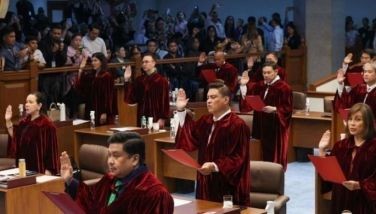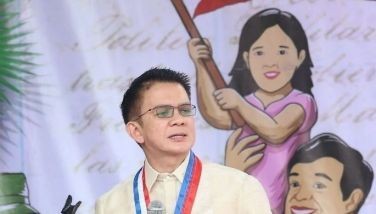Doing well in other countries
October 1, 2002 | 12:00am
Many are puzzled that Filipinos do so well in other countries. Languishing while in the Philippines, they quickly transform once abroad into productive citizens of their adopted countries, reflecting much civic-mindedness and enjoying a decent reputation in their immediate communities.
Serious reflection easily unravels the mystery. However, such reflection also could be enormously painful. It provokes a deep sense of regret that we could not keep these people and make them functional in their own country. It also infuriates that so little that is needed to have them stay has been denied these people, driving them to live and worthily serve in alien societies.
After all, a good number at the time they migrated already comprised the Philippines’ best and brightest people – highly competitive in whatever society they might find themselves in, aching to prove their worth as professionals and bound to be successful in mostly any environment that gives them a fair chance to prove themselves. Highly skilled professionals, they would have stayed in this country if they had had the requisite opportunities for professional growth and development. Still relatively young and barely starting their families, they also would have forgone foreign climes if their own society had not hostaged them to incomes forcing most to live materially deprived lives.
In the last forty years, legions of Filipino doctors, medical technicians, nurses, engineers, accountants, teachers and other professionals have gone abroad in search of professional advancement, better compensation and a kindlier environment within which to raise their progenies. They are to be found mostly in the United Sates, Canada and Australia but mostly every other developed country in the world has had a significant infusion of highly-skilled, talented and competitive Filipino professionals.
It may well be that no country in the past one hundred years has had as big a proportion of its talented citizenry leave for abroad in search of the proverbial greener pastures. It may be safely conjectured that no country historically experienced such a flight of its most talented people without also paying a heavy cost for the vacuum that they left in deciding to migrate. The Filipino diaspora is an ongoing phenomenon, fed by an increasing frustration on the part of those remaining bright and promising people who see little hope in remaining in the Philippines.
The fantastic compression of time and space made possible by modern developments in transportation and communication is extremely facilitative of the personal decision to leave one’s country for more as well as better opportunities elsewhere. Bright people everywhere not only have quicker and more reliable information regarding these opportunities; they also have faster access to them wherever they might exist worldwide.
Another phenomenon – globalization – also serves to create much volatility in the national pools of talented citizens. Globalization does not only integrate the various economies and markets of the world, it would also make skilled labor – the singularly most important factor of production effectively defining comparative advantages among globally competitive groups – highly mobile across increasingly permeable national boundaries.
On account of these developments, one must anticipate more and more Filipinos deciding not only to work but also to raise their families abroad. Most of them and their first generation progenies will probably continue to have a particular attachment to the Philippines.
Many will yield to the call of annual vacations, alumni homecomings, local family or clan reunions and similar emotionally-charged balikbayan activities. Many of the original migrants may even rationally choose to retire in this country as the emotional and financial cost of being a senior citizen in developed societies could be formidably high. Sentimentally, a good number of retirees may want to be interred upon their death in the very land that they had to leave that they might better live.
Few of them, however, will now choose to repatriate themselves and their families in a willful repudiation of the societies they had migrated to. After all, they had found in these societies what they had sought for so long in their land of birth. Enough opportunities for personal and professional growth, a work ethics that linked productive work with sensible material returns, a societal context where sufficient predictability governs the operation of he laws and those who enforce them, a kindlier sense of overall nature and all its denizens and — above all – a sustainable sense of one’s person as a decent human being — all of these helped make these Filipinos develop their potentials more fully in a foreign setting than in their native land.
No society is perfect and these Filipinos’ societies of choice are far from perfect. However, thsoe who have left the country generally understand the difference between an imperfect society that allows for enough human development to actually take place and another imperfect society where human development is simply talked to death in innumerable conferences, symposia, workshops and other time-killing venues.
Filipinos who do well abroad have learned not to trade words for action anymore. That is the main reason why they acted to leave a much beloved country and that is why they are mostly doing well wherever they may be now.
Serious reflection easily unravels the mystery. However, such reflection also could be enormously painful. It provokes a deep sense of regret that we could not keep these people and make them functional in their own country. It also infuriates that so little that is needed to have them stay has been denied these people, driving them to live and worthily serve in alien societies.
After all, a good number at the time they migrated already comprised the Philippines’ best and brightest people – highly competitive in whatever society they might find themselves in, aching to prove their worth as professionals and bound to be successful in mostly any environment that gives them a fair chance to prove themselves. Highly skilled professionals, they would have stayed in this country if they had had the requisite opportunities for professional growth and development. Still relatively young and barely starting their families, they also would have forgone foreign climes if their own society had not hostaged them to incomes forcing most to live materially deprived lives.
In the last forty years, legions of Filipino doctors, medical technicians, nurses, engineers, accountants, teachers and other professionals have gone abroad in search of professional advancement, better compensation and a kindlier environment within which to raise their progenies. They are to be found mostly in the United Sates, Canada and Australia but mostly every other developed country in the world has had a significant infusion of highly-skilled, talented and competitive Filipino professionals.
It may well be that no country in the past one hundred years has had as big a proportion of its talented citizenry leave for abroad in search of the proverbial greener pastures. It may be safely conjectured that no country historically experienced such a flight of its most talented people without also paying a heavy cost for the vacuum that they left in deciding to migrate. The Filipino diaspora is an ongoing phenomenon, fed by an increasing frustration on the part of those remaining bright and promising people who see little hope in remaining in the Philippines.
The fantastic compression of time and space made possible by modern developments in transportation and communication is extremely facilitative of the personal decision to leave one’s country for more as well as better opportunities elsewhere. Bright people everywhere not only have quicker and more reliable information regarding these opportunities; they also have faster access to them wherever they might exist worldwide.
Another phenomenon – globalization – also serves to create much volatility in the national pools of talented citizens. Globalization does not only integrate the various economies and markets of the world, it would also make skilled labor – the singularly most important factor of production effectively defining comparative advantages among globally competitive groups – highly mobile across increasingly permeable national boundaries.
On account of these developments, one must anticipate more and more Filipinos deciding not only to work but also to raise their families abroad. Most of them and their first generation progenies will probably continue to have a particular attachment to the Philippines.
Many will yield to the call of annual vacations, alumni homecomings, local family or clan reunions and similar emotionally-charged balikbayan activities. Many of the original migrants may even rationally choose to retire in this country as the emotional and financial cost of being a senior citizen in developed societies could be formidably high. Sentimentally, a good number of retirees may want to be interred upon their death in the very land that they had to leave that they might better live.
Few of them, however, will now choose to repatriate themselves and their families in a willful repudiation of the societies they had migrated to. After all, they had found in these societies what they had sought for so long in their land of birth. Enough opportunities for personal and professional growth, a work ethics that linked productive work with sensible material returns, a societal context where sufficient predictability governs the operation of he laws and those who enforce them, a kindlier sense of overall nature and all its denizens and — above all – a sustainable sense of one’s person as a decent human being — all of these helped make these Filipinos develop their potentials more fully in a foreign setting than in their native land.
No society is perfect and these Filipinos’ societies of choice are far from perfect. However, thsoe who have left the country generally understand the difference between an imperfect society that allows for enough human development to actually take place and another imperfect society where human development is simply talked to death in innumerable conferences, symposia, workshops and other time-killing venues.
Filipinos who do well abroad have learned not to trade words for action anymore. That is the main reason why they acted to leave a much beloved country and that is why they are mostly doing well wherever they may be now.
BrandSpace Articles
<
>
- Latest
- Trending
Trending
Latest





























